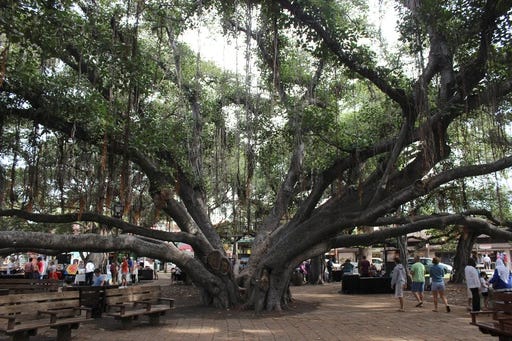Like many of you, I’ve been following the news about wildfires in Hawaii, especially that which largely destroyed all of Lahaina on the island of Maui. As I wrote in this space not too long ago, my family and I visited Maui last year—our first real vacation—and we stayed in Lahaina. The trip, and Lahaina in particular, provided a transformative experience.
Hawaii, the most remote place on earth, revealed to me the truth that distance does matter. We traveled to Lahaina at a time when my job was likely literally killing me, and I could not remember a single time of peace—the thoughts swirling through my head at every moment involved work-related versions of “What is it I’m not doing?” Even smaller trips or vacations involved visiting additional family, being visited by additional family, and all the smaller stressors such things generate. Small, I know, but to just be somewhere as a family, far away, in a place that far exceeded my stereotypical preconceptions—it was heaven on earth because our heaven is our planet. Heaven is earth.
I was certainly a tourist, but one with reverence. Reverence for the sand and water. Reverence for the waves and ocean tug that gently let you know how infinitesimal your strength is while in the grip of what might as well be a god. Reverence for sea turtles that formed a ring around me as I swam, as if they knew I had never seen ocean life and wanted to introduce me to their place in the world. Here. This is us. Even a lifetime of conditioning by film and television didn’t make me fear reef sharks, even when one turned, very briefly, toward me—a quick lesson in humility like that provided by the undertow.
As I wrote in an earlier post, we toured the home and land of former U.S. Poet Laureate, W.S. Merwin, who along with his wife, Paula, double handedly planted an entire forest over the course of nearly fifty years. One or two people certainly can make a difference. We spent a good deal of time in the historic Front Street district, where the massive, majestic Banyan tree draws thousands of people, palms outstretched to touch what feels like a shrine. The tree’s survival is now in doubt. Richard Powers’s novel Overstory has been ringing in my heart each day since I read it.
And yes, we were consumers—I am not much for possessions, but the lava stone necklace I purchased on Lahaina’s Front Street acts as my talisman. I randomly walked into a fine art gallery only to be greeted by several Chagall and Picasso paintings, as well as the creations of artists whose work connected to the sea, to the land, to Hawaii and its culture. Yes, they are things, but what has happened to them? I remember talking with the curator, asking something as dumb as “So, let’s say I could afford a Chagall. I would come all the way here and then what? Ship it home? Does that cost a lot?” Then directly across the street: Cheeseburger in Paradise. Truer words never spoken.
My younger daughter, upon hearing of the fires, said, “Don’t tell dad. It will make him sad.” Ah, to be known so well.
But all of this reads very privileged. I traveled to one of our fifty states and fell in love with its world. For many people, like me, this is how we will first experience the devastation of climate change: as “something” that impacts our memories before it directly impacts our bodies or lives. As “something” occurring at a distance, to other places and people. At least 36 people are dead in fires that can be partially attributed to our changing climate reality.
Hawaii has the highest cost of living in the US, and much of the local population depends on the tourist industry, like that in Lahaina, for their livelihoods. In some sections of Maui, the homeless populate stretches of beachfront between highway and ocean. People jumped into the ocean to escape flames. But Hawaii is distant. It’s “way out there.” It’s where most people journey with the intent of return—Maui’s airport, built for the transient, now provides sanctuary for permanent residents (I am reminded of Station Eleven).
Who could have known? Here’s an article describing island nations pleading for help in 2009. We’ve already asked questions such as “What if an island nation fully submerges?” We expend more energy writing articles about “climate change fatigue” than we do engaging the problem itself.
But it’s coming, closer and closer, this that we have wrought. Oh, the many miles that I’ve driven, hundreds of thousands. Oh, all the meat that I’ve eaten and loved. Oh, how good I’ve felt about upgrading lightbulbs and driving a hybrid vehicle until the Wisconsin weather made it, ironically, too impractical. And then the idea of what the world will be, my children living in it, and me possibly gone, no protection to offer. Still, we’re so far away from progress that we fraudulently argue over “protecting” children… from reading!
I don’t have more to add that is meaningful, but Lahaina, a “census-designated place” in the United States is gone, but to many it will still feel far away. I’ve written two posts titled “Can one person make a difference?” I better start asking myself that every day.
Today I’m sad about a memory, about a place that I’ve been to and loved. But when I look ahead, even that will prove to be an exquisite privilege.
Update: Current death toll at 93. This is absolutely devastating.






Wow this is a tremendous piece of writing. Hit me right in the heart. Those poor people and that poor city.
So very sad...